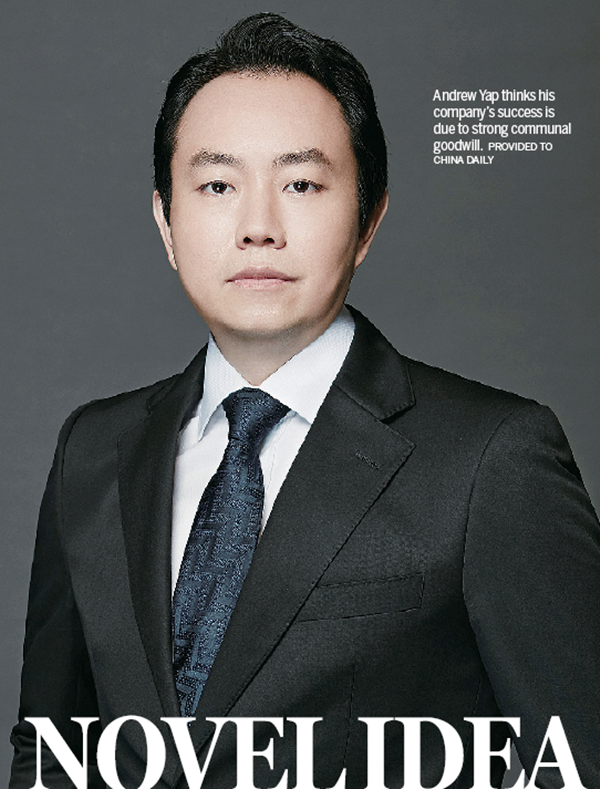Novelo idea

Imagine a 24-hour book sale that lasts for days and offers millions of titles at discounts of up to 95 percent off retail price. This was the stuff of fantasy for bibliophiles until 2009, the year that the Big Bad Wolf (BBW) Book Sale was born.
It is believed to be the world's only such event that markets "overprints" and "remainders" — titles that remain in a publisher's warehouse as the print run exceeds demand — on such a mammoth scale.
What originated as the mother of all book fairs in Malaysia has begun to snowball into an international phenomenon.
Following successful events in Indonesia and Thailand, the BBW Book Sale will debut in Wuhan, capital of Central China's Hubei province, this September. It will see BBW Books collaborating with Hubei Xinhua Bookstore, owner of the largest bookstore chain in China.
The brainchild of Malaysian entrepreneur Andrew Yap, the BBW Book Sale is inspired by a personal story about an unfulfilled need.
Yap was aged 10 when his father passed away. Thus, books were a luxury as he was more focused on helping his mother who juggled two jobs to support him and his three siblings.
At 14, Yap teamed up with friends and convinced a major comic distributor in the United States to send them old comic books, which they sold to their peers.
On the downside, his studies suffered. "It didn't help that I was mildly dyslexic," he said.
After completing his secondary education in Kuala Lumpur, Yap, a motor racing enthusiast, ran a workshop because, "if you don't have money and want to be a racecar driver, the only way to start is by working in a car workshop".
During a motor show in Singapore, he saw a newsstand peddling collectors' car magazines. That gave Yap the idea to open a bookshop selling specialized magazines.
So, along with his wife, Jacqueline Ng, he started a bookstore in the basement of a neighborhood mall in 2006.
It was a matter of time before they learned about remainder books. Yap then saw an opportunity to make books affordable to all, a luxury he had to forgo during his childhood.
Without much ado, the couple used their savings to start BookXcess, Malaysia's first-ever remainder bookshop.
Occupying a more visible shop on the upper floor of the same mall, BookXcess began with several hundred books. Without any retail background, Yap and Ng relied on feedback from their customers.
"By manning the cash register ourselves and talking to our customers, we got invaluable feedback on which books are good, which authors are popular (and) how to make the space more engaging for our customers," Yap said.
Before long, BookXcess became a popular hangout among readers who were thrilled to spend only a fraction of regular prices.
However, Yap noticed that they were not so successful at converting non-readers into readers — a perennial problem that bookstores face. So a customer suggested they hold an event.
"People have a tendency to bring company when they attend an event. A book-loving parent might bring along his non-reading child, for example," said Ng.
Yap chose the Big Bad Wolf moniker for the book sale. The name "initially met with protests because of its villainous association with the character in the fairy tale, Little Red Riding Hood", he noted.
"Eventually, the rest of the team was persuaded by the catchy and cheeky overtones, and it has really caught on."
In 2009, the inaugural book sale took place in a small exhibition center in the Kuala Lumpur suburb of Petaling Jaya.
But the team underestimated the reach of their grassroots support. Traffic around the venue came to a standstill and the 40-strong staff struggled to cope with customers who swarmed to get their hands on the 120,000 books on offer.
Today, the scale of the event and hype has only swelled with each successful sale. A typical BBW Book Sale is a carnival featuring food vendors, souvenir stalls and appearances by personalities.
"We had a family who drove for 12 hours in a van. Their goal was to come for the sale, buy the books and drive back home, since they had no budget to rent a hotel room.
"Some people even take annual leave just to buy books."
The behemoth task of preparing for a sale starts a year in advance with Yap and Ng traveling to meet publishing contacts in the US, the United Kingdom, Australia and Singapore.
Once orders are made, the books are delivered to the headquarters in Shah Alam, capital of the west Malaysian state of Selangor. Here, the books are categorized and sorted by genre.
The BBW headquarters looks like any typical warehouse, until you step into the building.
From an elevator painted with fangs wrapped around the caption, "Come in, I promise I won't bite", to odd furniture like an armchair-bookshelf in the lobby, the company exudes a quirky personality.
This image extends to its merchandise and pun-driven marketing campaigns. The company's recruitment ads seek marketing "ninjas" and customer relationship manager "rock stars".
No one is more aware than Yap that the company's success is due to the strong communal goodwill that grew from its beginnings as a champion of the underdog.
"If you see our Facebook page, our tone is not corporate. Customers don't speak to BBW Books; they speak to the wolf character.
"That's why we have stuck firmly to our absurdly low prices, so that our customers can buy more and give them to their friends who didn't come for the sale.
"To finance (the book sales in this manner), it doesn't make much sense but it is in tandem with our mission to increase readership."
However, in 2014 Yap found it difficult to obtain a loan for the 38-million-ringgit ($8.5 million) headquarters. Most banks gave the same response: This was a "sunset industry" and to qualify for such a hefty loan, the company needed a 20-year track record.
He finally hit pay dirt with the sixth bank — simply because three of the approvers were big fans of BBW.
In recent years, the company has diversified its retail offerings with stationery, bags, T-shirts and postcards. It also runs an online bookstore.
Yap believes e-commerce will be a game changer, especially in Hong Kong, Taiwan, Thailand and Indonesia, where English-language books are expensive.
The BBW Book Sale remains the main source of revenue, as well as expenditure. Monthly overheads, including salaries, loan repayments and utilities, account for 500,000 ringgit.
In the last two years, global expansion has become a major part of the agenda.
In 2016, the company made inroads into Indonesia and Thailand where it enjoys an advantage.
"Apparently, they don't have crazy warehouse sales in Bangkok and Jakarta. Nobody has done 24-hour (book sales) for 12 days nonstop," said Yap.
In May 2016, the company brought 1.5 million books to Jakarta. Though it was challenging due to the red tape involved, the event was a huge success.
"The crowds were crazy. We were so chuffed that the education minister himself came to launch it," Yap said.
In August, the team brought the BBW Book Sale to Bangkok and shifted 1.8 million books.
To target Chinese book lovers, the company struck a deal last year with Hubei Xinhua Bookstore, a subsidiary of publication giant Hubei Changjiang.
The memorandum of understanding involved the Chinese publisher supplying half a million books for the Kuala Lumpur book sale in December.
Next up is the debut BBW Book Sale in Wuhan in September.
The story of how the partnership began testifies to BBW's ascendant reputation, according to Yap.
"Someone told them: ‘If you want anything to do with books and really make a difference, these are the right people to talk to,'" he said.
"They flew to Malaysia and we showed them our premises and videos of what we did in Bangkok and Jakarta. It gave them the confidence that no one else in the world has the complete package of knowledge, expertise and experience as we do."
Once too poor to even buy a book, Yap may well be on his way to revolutionizing the industry. But he believes he is only getting started.
"I believe that if you pass the correct book to the correct kid, this kid can become the president (of his country). If we really want to make a difference in the world, we want to make everyone into readers.
"We're far from achieving this goal, but by making reading affordable, we can remove one more barrier to literacy."
















